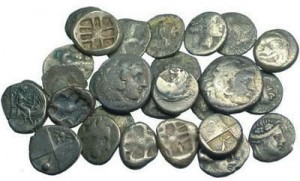The Gospel of Matthew – Part 5
Chapters 16-17: Who is Jesus?
After warning his disciples about the Pharisees and Sadducees, Jesus turns away from those leaders and from the Galilean crowds to focus on his disciples. The encounter at Caesarea Philippi and the Transfiguration dominate this section.
Most people thought that Jesus was one of the prophets come back to life. Jesus asks the disciples about his identity. Peter correctly answers, “You are the Messiah, the Son of the living God.” Peter, by God’s grace, is the first to be able to join the popular notion of “Messiah” with Jesus’ identity as the Son. “Son of the living God” corrects the popular notion – political/military – of the Messiah. (Despite God’s revelation, Peter will soon misunderstand.) Jesus tells Peter that he is Rock and on this Rock he will build his Church. The wordplay is lost in English, Peter/Rock; it is close in Greek, Petros/petra; it is perfect in Aramaic (the language of Jesus and his disciples), kepha, used for both Peter’s nickname and the geologic feature: “You are Kepha and on this kepha I will build my Church.” Jesus founded his Church on Peter personally, not just on his act of faith as some contend.
Many a cartoon has pictured Peter as the gate-keeper to heaven. This is not the meaning of Jesus’ giving Peter the keys of the kingdom. The background may be Isaiah 22:15-22 in which one master of the palace is replaced by another in the reign of King Hezekiah of Judah. The key of the house of David was literally worn on the shoulder of this man. Peter’s possessing the keys means that he exercises delegated authority (from Jesus). Peter is to be the Church’s authoritative interpreter of God’s law. Yet, when confronted by Jesus’ announcement that he will suffer and die, Peter tries to dissuade him. The Rock has quickly become a stumbling block.
On the mount of Transfiguration, Jesus reveals the splendour of his divinity, manifesting to his chosen witnesses who he really is, the Son of God. The Father’s voice from heaven is heard, repeating what he said at Jesus’ baptism, “This is my Son, the Beloved; with him I am well pleased.” But then the Father adds emphatically, “Listen to him!” This is not a generalized command. Rather the Father is directing the disciples to listen to what Jesus has been saying about his destiny. Peter and the others will need to come to grips with the fact that “the Messiah, the Son of the Living God” will go to the cross.
In chapter 17, verses 24-27, Matthew tells the seemingly whimsical story. Wouldn’t we all like to have such a miraculous catch of fish at tax time? The story contains a reminder of who Jesus is (reinforcing the message of the Transfiguration) and an example of the responsible Christian use of freedom. The Christology message comes in Jesus’ dialogue with Peter. The kings of the earth take taxes from others, not from their own children. Jesus is Son of God, and as such is not obligated to pay for the support of the Temple, the house of his Father. By their union with Jesus as brothers and sisters, disciples also are children of the Father and also are exempt from the tax. Nonetheless, our freedom as God’s children must be used in such a way that we do not scandalize others. So, Jesus paid the annual Temple tax.
Chapter 18 – Living in the Church
Childlike lowliness, rather than grasping for rank or status, is a requirement for entering the Kingdom. The Church must be marked by the willingness to forgive, but must also have the ability to address serious sin among its members. Otherwise, how can the Church seek the “surpassing righteousness” to which Jesus calls us (5:20)? Peter suggests forgiving a fellow disciple seven times. Generous, right? But Jesus expands the number to seventy-seven times (“seven times seven times” is another possible translation). The parable uses hyperbole to make its point. The first servant owes the king 10,000 talents, more than the annual produce of the Roman Empire’s eastern provinces combined. The debt could never be repaid. But the king cancels the debt. The first servant then encounters a fellow servant who owes him only a hundred days wages, a manageable sum. But the first servant’s refusal to show the second servant generous forgiveness is an affront to the most generous Lord. Forgiving our neighbour is not always easy, but is definitely necessary, though it may take time. Being able to forgive is a grace from God.
Chapters 19-20: Kingdom Values
The New American Bible translates Matthew 19:9 thus: “I say to you, whoever divorces his wife (unless the marriage is unlawful) and marries another commits adultery.” This translation is preferable to that of the New Revised Standard Version. Luke 16:17-18 explicitly prohibits divorce and remarriage, as does Mark 10:2-12. So why does Matthew include an exception to this rule?
 Matthew, the Jewish-Christian evangelist, was insisting that when Gentiles converted to the Faith, if they were in marriages prohibited by Leviticus 17-18 and Acts 15:28-29, those ‘marriages’ had to be dissolved. The ‘exception clauses’ in Matthew are not exceptions from Jesus’ consistent teaching that a true marriage is indissoluble. Rather, Matthew clarifies by means of the ‘exception clauses’ that marriages within the forbidden degrees of kinship are not real marriages at all. The Catholic Church still considers a marriage true and binding, unless one or more impediments existed from the very beginning.
Matthew, the Jewish-Christian evangelist, was insisting that when Gentiles converted to the Faith, if they were in marriages prohibited by Leviticus 17-18 and Acts 15:28-29, those ‘marriages’ had to be dissolved. The ‘exception clauses’ in Matthew are not exceptions from Jesus’ consistent teaching that a true marriage is indissoluble. Rather, Matthew clarifies by means of the ‘exception clauses’ that marriages within the forbidden degrees of kinship are not real marriages at all. The Catholic Church still considers a marriage true and binding, unless one or more impediments existed from the very beginning.
Jesus opposed the hierarchical and patriarchal status quo and demanded a more equitable pattern of relationships. Not only are husbands and wives equal partners in creating a union of “one flesh,” but children are to be welcomed instead of marginalized, and wealth is not to be used to define one’s worth.
I once knew an elderly gentleman who had just recently been baptized. The man had paid no attention to religion for many years, but his joining AA marked a turning point, not only for his sobriety but also for the first stirrings of faith. The Catholic man who was this gentleman’s sponsor in AA became his sponsor for initiation into the Catholic Church. The gentleman shared with me that he had at first been reluctant to come forward and request baptism. He had ignored God for many years. Would God want him now? His reading of the parable in Matthew 20 is what convinced him that God’s love is always available. He said, “I guess I’m getting hired late in the day.” Jesus’ parable is not about a landowner needing help but rather about a landowner who gives help. God freely gives his grace to all.

 Entries(RSS)
Entries(RSS)